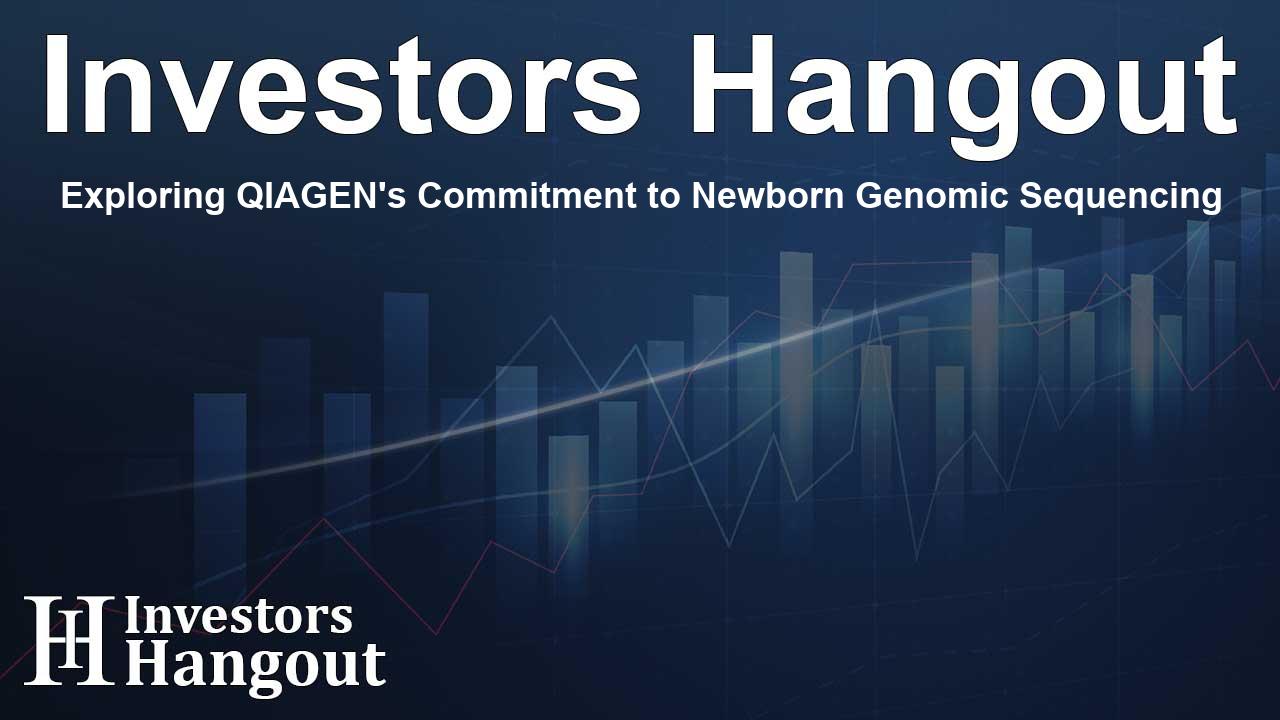Exploring QIAGEN's Commitment to Newborn Genomic Sequencing

Innovating Genomic Sequencing for Newborns
QIAGEN (NYSE: QGEN) is making significant strides in the field of genomic medicine by partnering with Genomics England on a remarkable initiative aimed at sequencing the genomes of newborns. This pioneering effort seeks to screen for over 200 genetic conditions, facilitating early diagnosis and intervention for rare health issues.
A First-of-Its-Kind Initiative
The Generation Study is designed to analyze the genomes of 100,000 newborns in England, focusing on the early identification of conditions that may otherwise go unnoticed until later in childhood. With the advent of this study, families will potentially benefit from improved healthcare where proactive measures can be taken to address genetic disorders before they manifest.
The Role of Clinical Knowledge
QIAGEN’s Clinical Knowledge Base will play a crucial role in this endeavor, as the company will be the sole provider of clinically relevant variant content for the sequencing tests used in this program. This partnership underscores the importance of accurate variant interpretation, which is vital in determining health risks in newborns.
The Impact on Newborn Health
Launching this transformative initiative is crucial, particularly for newborn screening programs. Each year in the UK, around 3,000 babies are born with conditions that could benefit from early diagnosis and intervention. By screening newborns for treatable conditions like Metachromatic leukodystrophy (MLD), the Generation Study aims not only to improve health outcomes but also to extend lives.
Expert Curation and Data Handling
Quality assurance is paramount; therefore, QIAGEN employs a manual and computational approach to curate genomic content. This ensures that the knowledge extracted and provided is both accurate and relevant to clinical practice, helping healthcare professionals make informed decisions based on solid evidence. With over two decades of experience in genomic data management, QIAGEN has created an extensive library that aids both researchers and clinicians.
Expert Insights from QIAGEN
Dominic John, Head of QIAGEN Digital Insights, expressed gratitude for the opportunity to be part of such a transformative initiative. He noted, “There is no room for error when screening newborns at risk for rare diseases. Our collaboration aims to bring the benefits of whole-genome sequencing to thousands of families.”
Supporting New Families
The Generation Study not only focuses on identifying genetic conditions but also fosters a community approach to health care. By ensuring nationwide access to these genomic capabilities, families can be informed about potential health issues from the outset, significantly shaping the future of pediatric healthcare.
Challenges and Solutions in Genomic Sequencing
While the promise of genomic sequencing is immense, the execution of such studies also faces challenges. One of the hurdles is ensuring that variant interpretations are accurate and deliver meaningful health information. Dr. Ellen Thomas, Chief Medical Officer at Genomics England, highlighted the importance of expert-curated content in safely returning results to parents, emphasizing the study's thorough approach to variant analysis.
Building a Trusted Knowledge Base
The QIAGEN Clinical Knowledge Base is a meticulously curated resource that integrates biological content from over 40 sources. This extensive database facilitates the analysis of genomic variants, enhancing the reliability of results for more than 4 million patient test cases worldwide. This substantial expertise positions QIAGEN as a trusted leader in the genomic content realm, heralding a new era of patient care.
Conclusion
By collaborating on the Generation Study, QIAGEN is not only advancing genomic studies but also improving the potential for better health outcomes for newborns throughout the UK. This strategic initiative sets the stage for future genomic health advancements.
Frequently Asked Questions
What is the Generation Study?
The Generation Study aims to sequence the genomes of 100,000 newborns in England to screen for over 200 genetic conditions, enabling earlier diagnosis and treatment.
How is QIAGEN involved in the initiative?
QIAGEN provides expert-curated genomic content essential for accurate variant interpretation and reporting in the newborn screening tests used in the study.
What are the benefits of early genome sequencing?
Early genome sequencing can identify potential health risks in newborns, allowing for timely interventions that may prevent severe health issues or disabilities.
What conditions are being screened in newborns?
The study focuses on over 200 treatable genetic conditions that can affect newborns, aimed at significantly improving their health outcomes.
How does the QIAGEN Clinical Knowledge Base enhance the study?
QIAGEN’s Clinical Knowledge Base incorporates data from numerous reputable sources, allowing for precise variant analysis, aiding clinicians in making informed decisions about patient care.
About Investors Hangout
Investors Hangout is a leading online stock forum for financial discussion and learning, offering a wide range of free tools and resources. It draws in traders of all levels, who exchange market knowledge, investigate trading tactics, and keep an eye on industry developments in real time. Featuring financial articles, stock message boards, quotes, charts, company profiles, and live news updates. Through cooperative learning and a wealth of informational resources, it helps users from novices creating their first portfolios to experts honing their techniques. Join Investors Hangout today: https://investorshangout.com/
Disclaimer: The content of this article is solely for general informational purposes only; it does not represent legal, financial, or investment advice. Investors Hangout does not offer financial advice; the author is not a licensed financial advisor. Consult a qualified advisor before making any financial or investment decisions based on this article. The author's interpretation of publicly available data presented here; as a result, they should not be taken as advice to purchase, sell, or hold any securities mentioned or any other investments. If any of the material offered here is inaccurate, please contact us for corrections.